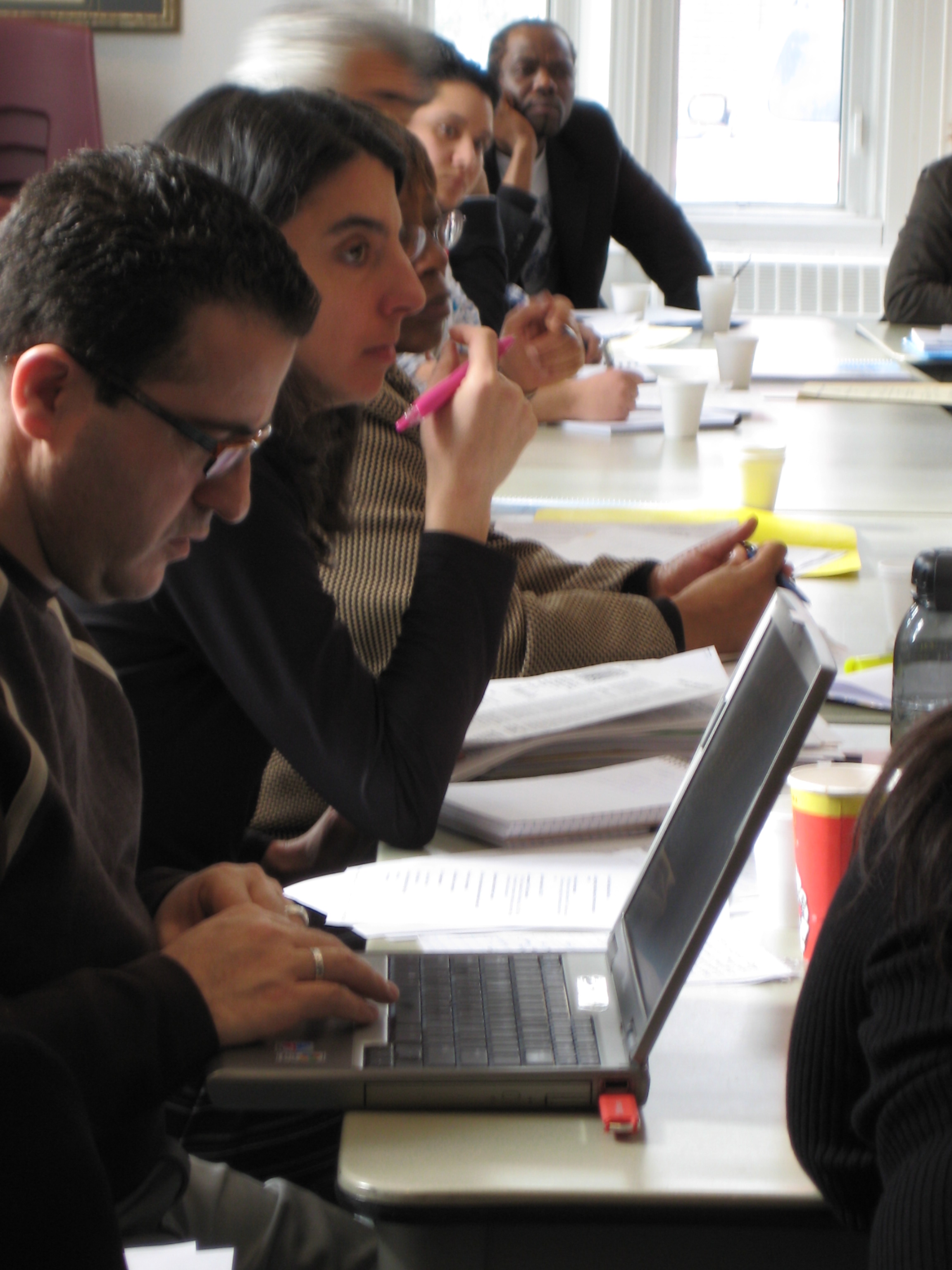|
Current issue and campaign pages: Oppose Conditional Permanent Residence for Sponsored Spouses |
|
Upcoming CCR meetings in 2012 and 2013:
Summer Working Group meetings, Friday, September 7 and Saturday September 8 2012, Montreal Fall Consultation, Thursday, November 29 - Saturday, December 1 2012, Toronto Winter Working Group meetings, Friday, February 22 and Saturday, February 23 2013, Toronto Spring Consultation, Thursday, May 30 - Saturday, June 1 2013, Vancouver |
Canadian Council for Refugees E-Chronicle Vol. 7 #5, 4 September 2012
CONTENTS:
- Upcoming changes to Canada’s refugee determination system
- UN Special Rapporteur on the Rights of Migrants at the CCR Working Group meetings this week. Join us!
- Become a CCR Youth Ambassador! Get involved with a SpeakUp! project! Stay tuned…
- Subscribe to the CCR’s bulletin on trafficking issues, next issue: 17 September 2012
- Interview with François Crépeau, UN Special Rapporteur on the Human Rights of Migrants
---
Canada’s refugee determination system is going to be changing in important ways, following the adoption by Parliament of Bill C-31 (Protecting Canada’s Immigration System Act). The government has not yet announced the implementation date for the provisions affecting the refugee determination system, but it may be in December.
In the meantime, there are many details still to be decided and preparations under way. The government has published draft regulations for comment (on August 4 and August 18) while the Immigration and Refugee Board has published draft rules for the Refugee Protection Division and the new Refugee Appeal Division. Also out for comments is the new, draft Basis of Claim form (BoC), which claimants will have to complete within 15 days of making their refugee claim at an airport, land border or seaport.
The new system, with its much faster timelines will present new challenges, primarily for the refugee claimants themselves, but also for the institutions and organizations that serve them. The CCR and many of its members are actively working to try to prepare themselves for the changes and to minimize the negative impacts.
The CCR has recently submitted its comments on the proposed regulations (mostly relating to processing timelines): http://ccrweb.ca/en/comments-regulations-processing-timelines
For more information from the CCR on these changes, see: http://ccrweb.ca/en/refugee-reform
- UN Special Rapporteur on the Rights of Migrants at the CCR Working Group meetings this week. Join us!
 End your summer the right(s) way for refugees! Participate in the Canadian Council for Refugees Summer Working Group meetings in Montreal, 7 and 8 September 2012.
End your summer the right(s) way for refugees! Participate in the Canadian Council for Refugees Summer Working Group meetings in Montreal, 7 and 8 September 2012.
All CCR members and allies are encouraged to attend the Working Group meetings, which are also open to others interested. The meetings are closed to media and government. There is no cost to participate in the meetings and no registration is necessary.
The meeting schedule is:
Friday 7 September:
9:30am - 5pm: Overseas Protection & Sponsorship Working Group meeting
Saturday 8 September:
9:30am - 5pm: Inland Protection Working Group meeting
9:30am - 5pm: Immigration and Settlement Working Group meeting
With Special Guest:
François Crépeau, UN Special Rapporteur on the Human Rights of Migrants on Migrants’ Rights in the International Agenda: Goals and limitations of the mandate of the UN Special Rapporteur
The United Nations system has recently shown interest in migrants’ rights, but progress is slow. States are fiercely defending their sovereign powers in the field and are wary of a UN institution leading them in a direction contrary to their interests.
François Crépeau will speak about how his office can influence States in adopting appropriate migration policies. Find out how, as Special Rapporteur, he tries to bridge the gap between States’ perceived interests and the expectations of civil society actors. Professor Crépeau’s talk is a must for anyone working on migrant rights issues in Canada and/or abroad.
Friday 7 September, 6 - 7:30 pm
Free admission – no registration required
Location for all events: Anglican Diocese of Montreal, 1444 Union Street, Montreal (metro McGill)
For more information, including directions: http://ccrweb.ca/meetings
 Do you want to:
Do you want to:
- Support local newcomer youth in standing up for their rights?
- Learn about important challenges facing refugees and immigrants in Canada?
- Be a part of the action to address these challenges?
- Connect with people who care about these issues?
- Develop leadership skills and experience by working with a well-established, national network of non-profit organizations?
Become a CCR Youth Ambassador! CCR Youth Ambassadors engage and support newcomer youth in organizing activities for refugee and immigrant rights local communities.
Or get involved with Speak Up!, with a youth-led small project grant. The CCR Youth Network regularly provides funding and support to groups of newcomer youth across Canada to develop creative public education and advocacy resources.
The CCR Youth Network will be launching a call for applications for new CCR Youth Ambassadors and for new Speak Up! Projects soon, so stay tuned!
For more information on CCR Youth Ambassadors, see: http://ccrweb.ca/en/youth/youth-ambassadors
For more information on the Speak up! small grants program, see: http://ccrweb.ca/en/speak-up/apply
 Are you interested in learning about trafficking in persons in Canada? Want to find out about anti-trafficking initiatives across the country? Looking for ideas to promote the rights of trafficked persons in your community? Then you may be interested in subscribing to the CCR’s Electronic Bulletin on Trafficking.
Are you interested in learning about trafficking in persons in Canada? Want to find out about anti-trafficking initiatives across the country? Looking for ideas to promote the rights of trafficked persons in your community? Then you may be interested in subscribing to the CCR’s Electronic Bulletin on Trafficking.
Published every two months, the CCR’s trafficking bulletin provides cross-regional updates on trafficking issues in Canada and abroad, and on different organizations’ responses to trafficking. This bulletin is part of a wider effort to share information and ideas between organizations working on trafficking across Canada.
To subscribe to the bulletin, to receive past issues, and to contribute to future issues, please send an email to traffickingbulletin@ccrweb.ca. Watch for the next issue out on 17 September 2012.
 François Crépeau, United Nations Special Rapporteur on the human rights of migrants and professor of international law at McGill University, will be our special guest at the CCR Working Group meetings in Montreal later this week. To help us better understand his role as UN Special Rapporteur and some of the goals he has set for his mandate, we recently reached him for an interview.
François Crépeau, United Nations Special Rapporteur on the human rights of migrants and professor of international law at McGill University, will be our special guest at the CCR Working Group meetings in Montreal later this week. To help us better understand his role as UN Special Rapporteur and some of the goals he has set for his mandate, we recently reached him for an interview.
Most importantly, his role is to ‘report’: “I'm neither judge nor police officer nor lawyer. My job is to interact.” With the aim of changing attitudes within the UN, he writes thematic reports and makes official state visits to support the work of the UN Human Rights Council’s state members and even the UN General Assembly. His reports and communications also serve as tools for many intergovernmental organizations that focus on migration issues and non-governmental organizations (NGOs) that document the human rights violations of migrants.
As Special Rapporteur, Professor Crépeau sets his own priorities and has chosen “irregular migration is not a crime” as the theme for his work. To him, any immigration violation regarding entry and residence is an administrative offense, and is not be considered with the same weight as a serious crime against person, property or national security. To respect migrant rights, we therefore need to tackle migrant exclusion.
For Professor Crépeau, this theme presents an important challenge, not only for him as Special Rapporteur, but also for democratic states. “Migrant inclusion cannot happen through the traditional political or democratic means that recognized detainee rights or rights based on sexual orientation. Unlike citizens, migrants do not vote and they have little influence through political parties. Furthermore, they rarely complain and they do not rely on courts to enforce their rights.”
How then do we change the policies of exclusion against the most vulnerable migrants? According to Professor Crépeau, it is important to support politically-independent bodies such as courts, organizations and community groups. Each has an important role to play in upholding migrants' rights before courts, independent commissions and international organizations. Community groups and others upholding migrant rights must work together to a greater extent: “There are many connections to be made and I [in my role as Special Rapporteur] am only one of the actors that need to be involved.”
Want to find out more? Join the CCR meetings in Montreal next Friday evening when we have the honour of hearing more from Professor Crépeau. For more information, see: http://ccrweb.ca/en/meetings
Looking for other ways to stay in touch with the CCR and refugee and immigration issues? Follow the CCR on:



